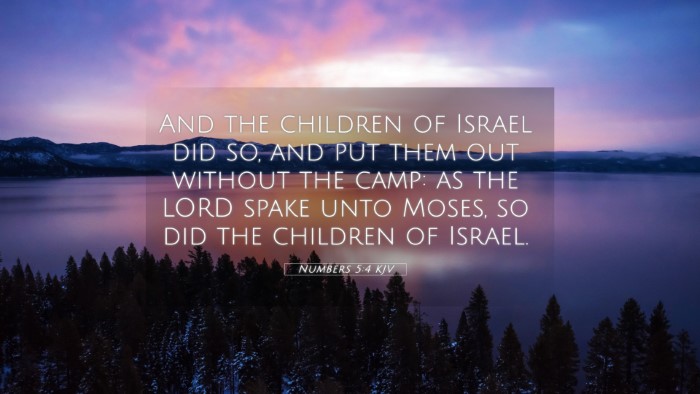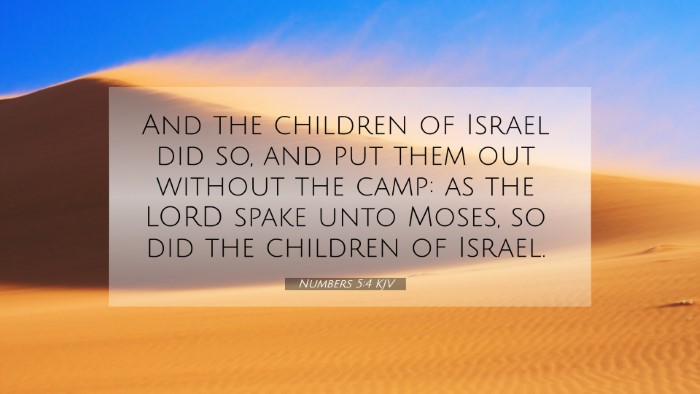Understanding Numbers 5:4
Verse Text: "And the children of Israel did so, and put them without the camp: as the LORD spake unto Moses, so did the children of Israel." (Numbers 5:4)
Overview of Numbers 5:4
This verse captures a specific moment of obedience among the Israelites as they follow God's command regarding those who were unclean. It illustrates their adherence to the laws given to them and reinforces the importance of purity within the community.
Insight from Commentaries
Matthew Henry's Commentary
Matthew Henry emphasizes the significance of holiness among God's people. In this context, the command to excommunicate those who are ceremonially unclean was a measure to maintain the community's sanctity and purity. He notes that the Israelites' obedience demonstrates their commitment to God’s ordinances. Henry suggests that this illustrates a vital principle: the necessity of separation from sin and all that is unclean to maintain a relationship with the Holy God.
Albert Barnes' Notes on the Bible
Barnes focuses on the practical implications of this command for the Israelites. He mentions that the act of putting the unclean outside the camp was not merely about physical cleanliness but symbolized spiritual and moral purity as well. Barnes elaborates on how this reflects God's desire for a pure people, who embody His holiness in their daily lives. This illustrates a clear message that sin, whether personal or communal, must be addressed to enjoy fellowship with God.
Adam Clarke's Commentary
Clarke provides a historical context for this verse, explaining the cultural practices surrounding cleanliness in ancient Israel. He notes that during this time, the Israelites understood the severe consequences of being unclean, which could lead to divine judgment. Clarke highlights the community's cooperation in following God's directive, which showcases their collective responsibility and trust in divine guidance.
Theological Implications
Numbers 5:4 serves as a reminder of the broader theological themes present in scripture such as holiness, obedience, and communal responsibility. The Israelites' action in separating themselves from the unclean mirrors the New Testament call for believers to pursue holiness and avoid sin in their lives. This verse and its surrounding context spur readers to reflect on how they engage with sin within their communities and the importance of maintaining a standard of righteousness.
Cross References
- Leviticus 13:46: "All the days wherein the plague shall be in him he shall be defiled; he is unclean: he shall dwell alone; without the camp shall his habitation be." - This verse similarly addresses the unclean and their exclusion, reinforcing the principle outlined in Numbers.
- Hebrews 13:13: "Let us go forth therefore unto him without the camp, bearing his reproach." - Echoing the theme of separation from the camp, it signifies a deeper spiritual meaning in the life of Christians.
- Ephesians 5:11: "And have no fellowship with the unfruitful works of darkness, but rather reprove them." - This emphasizes the continued call for the faithful to separate from sin.
- 1 Corinthians 5:13: "But them that are without God judgeth. Therefore put away from among yourselves that wicked person." - Similar to the Old Testament practice, this illustrates the need for moral standards in the Christian community.
- Matthew 18:17: "And if he shall neglect to hear them, tell it unto the church: but if he neglect to hear the church, let him be unto thee as a heathen man and a publican." - Advocating for church discipline parallels this Old Testament separation.
- 2 Corinthians 6:17: "Wherefore come out from among them, and be ye separate, saith the Lord, and touch not the unclean thing; and I will receive you." - A direct instruction reflecting the importance of separation from impurity.
- Revelation 21:27: "And there shall in no wise enter into it any thing that defileth, neither whatsoever worketh abomination, or maketh a lie: but they which are written in the Lamb's book of life." - This serves as a culmination of the purity theme found throughout scripture.
Thematic Connections
The themes presented in Numbers 5:4 resonate throughout both the Old and New Testaments, providing a rich tapestry of interconnected lessons on holiness and separation from sin.
The spiritual principles behind these actions can be explored through various Bible study methods including cross-referencing, illustrating God's unchanging standards for holiness throughout biblical history.
Conclusion
Understanding Numbers 5:4 through the lens of biblical commentaries and cross-references reveals the profound implications of obedience and purity. It encourages readers to draw connections between biblical texts and reflect on their practices in light of God's calling for holiness. As this verse shows, the Lord desires a people set apart, free from the contamination of sin, enabling them to walk in fellowship with Him.


